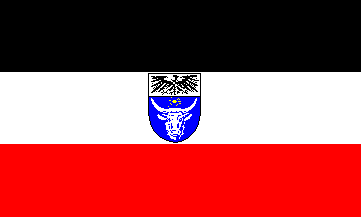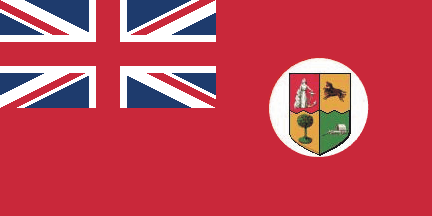
Fahnen, Flaggen und Kalender bei Fanshop-Online.de bestellen
This page is part of © FOTW Flags Of The World website.FOTW beschäftigt sich mit der Wissenschaft der Vexillologie (Flaggenkunde).
Alle auf dieser Website dargebotenen Abbildungen dienen ausschließlich der Informationsvermittlung im Sinne der Flaggenkunde.
Wir distanziert uns ausdrücklich von allen hierauf dargestellten Symbolen verfassungsfeindlicher Organisationen.
Flag History of Namibia
South West Africa, Südwest-Afrika, Suidwes-Afrika
Last modified: 2007-02-16 by bruce berry
Keywords: namibia | suedwestafrica | southwestafrica |
Links: FOTW homepage |
search |
disclaimer and copyright |
write us |
mirrors
See also:
Deutsch Südwestafrika (1884 -
1915) (German South West Africa) - proposed
 image by Mark
Sensen, 08 Oct 1999
image by Mark
Sensen, 08 Oct 1999
The German administration of South West
Africa lasted little more than three decades from 1884 to 1915. In
contrast to territories which made up the British Empire,
virtually all of which were granted a distinctive heraldic and vexillological identity, German colonies and protectorates
did not have their own heraldic devices or flags. Following in the Portuguese
and Dutch colonial practice, the Germans treated their overseas possessions an integral
part of one empire and consequently the Imperial German Arms and flags were
used throughout the Empire, including German South West Africa as Namibia was
then known.
During a visit by the then German Secretary of State, Dr. Solf, to German possessions in Africa
during 1912 - 1913, he noted that each of the British colonial territories had their own distinctive colonial emblem.
The fact that these "colonial flags"
all followed a single pattern made a great impression on Dr. Solf who submitted a memorandum to Kaiser Wilhelm II
stressing the desirability of adopting distinctive emblems for Germany's
overseas possessions. He went to far as to suggest
that the matter receive urgent attention. The Kaiser agreed and suggested that
Dr. Solf take the necessary steps to prepare the
appropriate designs. In close co-operation with Johann Albrecht, Duke of
Mecklenburg and the Herald's Office a series of designs were prepared and
submitted to the Kaiser.
The flags were to be based on the German horizontal tricolour
of black, white and red charged in the centre with a distinctive shield of the
colony. In the case of South West Africa, this
was to be a blue shield bearing a silver ox's head and diamond.
The outbreak of World War I in 1914 diverted attention to more pressing
matters and the flags designed for Germany's colonial possessions were
never taken into use.
Bruce Berry 13 Feb 1998
I noticed that in the key word NAMIBIA, you miss something very important,
even if you mentioned about the colonization of Namibia and the colonial flags
after the First World War, it should be noted that NAMIBIA was a German colony
from 1884-1915, after which the Union of South Africa
took control of this area. Did the German colony from 1884-1915 have its
own flag? This
site has interesting information.
Yannis C. Karayannis,
14 Aug 2001
Mandated Territory of South West Africa (1915 - 1990)
 image
by Mark Sensen, 08 Oct 1999 and Blas Delgado Ortiz, 14 May
2002
image
by Mark Sensen, 08 Oct 1999 and Blas Delgado Ortiz, 14 May
2002
During World War I South African troops entered South West Africa in February 1915 and the German forces
in the territory surrendered on 09 July 1915. South African forces thus occupied
German South West Africa for and on behalf of
the British Government. Until the signing of the Peace Treaty with Germany at Versailles
on 28 June 1919, South West Africa was
described as being a "Protectorate ... in Military Occupation of the Union
Forces".
 image
by Clay Moss, 07 Dec 2005
image
by Clay Moss, 07 Dec 2005
Under the mandate system, set out in Article 22 of the Versailles Treaty,
ex-enemy territory would be governed by individual states, which later would be
accountable to the League of Nations. South
West Africa was mandated to South
Africa and the South African
Red Ensign came to be flown in the territory
until 31 May 1928, when the South African national
flag (horizontal orange, white and blue stripes with flaglets
in the centre) was adopted.
Bruce Berry, 13 Feb 1998
 image by Mark
Sensen, 08 Oct 1999
image by Mark
Sensen, 08 Oct 1999
 image by Mark
Sensen, 08 Oct 1999
image by Mark
Sensen, 08 Oct 1999 image
by Mark Sensen, 08 Oct 1999 and Blas Delgado Ortiz, 14 May
2002
image
by Mark Sensen, 08 Oct 1999 and Blas Delgado Ortiz, 14 May
2002
 image
by Clay Moss, 07 Dec 2005
image
by Clay Moss, 07 Dec 2005